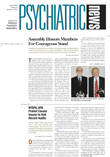The physician’s alliance with the patient is “the best-kept secret of medical care” and a special feature of the practice of psychiatry that sets it apart from all other specialties.
So said Leston Havens, M.D., and Harold Eist, M.D., in separate lectures at APA’s 2003 Institute on Psychiatric Services in Boston.
The two speakers, well known to APA audiences, reminded clinicians of the centrality of the relationship between patient and doctor—the “fit” between healer and health seeker—in the outcome of any therapeutic encounter.
Havens said there has been a growing scientific recognition of the importance of the therapeutic relationship to patient outcome, reflected in a burgeoning body of literature on the subject in the last 25 years.
It is now the “most robust finding in all of therapeutics,” he said.
Both speakers said that the alliance between doctor and patient was dependent on the recognition of the “personhood” of the patient—a concept that is at variance with the authoritarian nature of the medical encounter as it is traditionally understood.
“What we ally with is another person,” said Havens, a professor of psychiatry at Harvard Medical School. “But personhood is something that we approach—if we approach it all—with only a vague sense of what it might mean.”
Eist focused on the psychodynamics of medication, emphasizing the importance of the relationship between the prescribing physician and the patient in successful medication use.
He noted the exponential growth in literature on the subject of compliance with medication regimens: between 1981 and 1995, there were 2,500 articles on medication compliance, compared with just 500 studies up until 1975, he said.
He also cited a 1992 meta-analysis revealing that noncompliance was responsible for 6 percent of all hospitalizations and was “the single most correctable excess cost factor in medicine.”
But Eist also expressed disdain for the term “compliance,” a concept that he said has harmed medical care with its implications of passivity on the part of the patient.
Instead, he said, what is necessary for the successful use of medication is cooperation.
“Cooperation includes the patient as an active partner in a shared process, thereby enhancing self-esteem, which in turn facilitates more effective learning and more effective medication titration, lower overall dosages, and fewer side effects,” Eist said.
Eist is a private practitioner in Bethesda, Md., and a former APA president.
In a series of vignettes from his own practice, he described the subtleties involved in the psychodynamics of medication, explaining how a more simplistic approach in each case might have resulted in a breakdown in cooperation and in treatment failure.
“Careful listening requires an attention to concrete, symbolic, metaphorical, direct, hidden, confused, and affective components of the patient’s communications,” he said. “Unless we combine this kind of dynamic listening with our pharmacological knowledge, our medication practice will remain arbitrary, crude, superficially symptom focused, and often wrong.”
With 75 percent of all psychiatric patients on medication, Eist said, “it is clearly urgent that we learn how to develop effective treatment relationships that involve much more than writing prescriptions.” ▪
